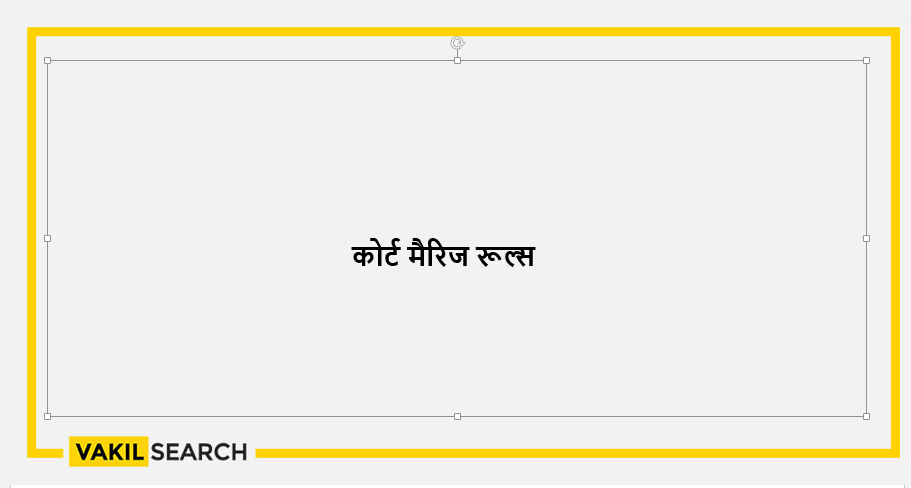A court marriage takes place as per the procedure laid down in the Act and is common across the nation. The following article will explain what is a court marriage and its consequences.
The marriage officer performs the marriage without discrimination based on caste, creed, or religion. It is a marriage solemnized according to law. The bride and the bridegroom can directly submit a court marriage application to the marriage officer to get their marriage certificate. The court marriage can be registered in the office of the marriage officer in whose area/jurisdiction the bride or bridegroom resides. Let us learn about the Consequences of Court Marriage in this blog.
Consequences of Court Marriage
Below given are some Consequences of Court Marriage:
Legal Recognition:
Court marriages are recognized as legally valid in most jurisdictions. The parties to a court marriage are considered to be legally married, with all the rights and responsibilities that come with that status. This means that the parties are entitled to the same rights and benefits as any other married couple, such as inheritance rights, tax benefits, and the right to make medical decisions for one another.
Divorce:
If a Consequences of court marriage ends in divorce, the parties must follow the same legal procedures as any other married couple. This typically involves filing for divorce and appearing in court to finalize the divorce. The divorce proceedings may be complicated if there are children or significant assets involved.
Child Custody:
If a court marriage ends in divorce and marriage couple has children, the court will make a determination as to the custody of the children. The court will consider the best interests of the children when making this determination. This can be a complicated and emotional process, particularly if the parties are unable to agree on a custody arrangement.
Property Division:
Spousal Support:
If a court marriage ends in divorce, the court may also award spousal support. This is financial support that is paid by one spouse to the other after the divorce. The court will consider the length of the marriage, the income and earning potential of each party, and other factors when making this determination.
Name Change:
If a court marriage results in a change of name for one or both of the parties, the parties must follow the legal procedures for changing their names. This typically involves filing a legal name change petition and appearing in court. The name change may also affect the parties’ official documents, such as their passports and driver’s licenses.
Domestic Partnership:
In some jurisdictions, court marriages may also result in a domestic partnership. Domestic partnerships are legal relationship that provides some of the rights and benefits of marriage, but they are not considered to be marriages under the law. Domestic partnerships may be available to same-sex couples or to opposite-sex couples who are not able to legally marry.
Immigration:
Court marriages can have significant implications for immigration. If one party to a court marriage is not a citizen of the country in which the marriage took place, the marriage may have an impact on the non-citizen’s immigration status. The non-citizen may be able to obtain a visa or permanent residency based on the marriage, but the process can be complicated and may take several years.
Inheritance:
Court marriages can also have implications for inheritance. If one party to a court marriage dies without a will, the surviving spouse may be entitled to a portion of the deceased’s estate. The extent of this entitlement will depend on the laws of the jurisdiction in which the deceased lived.
Health Care:
Court marriages can also impact health care decisions. If one party to a court marriage is unable to make decisions for themselves, the other party may be authorized to make medical decisions on their behalf.
Benefits of Court Marriage
Legal Recognition:
Court marriage provides legal recognition to the union of two individuals and it is a legally binding relationship.
Time and Cost Effective:
Court marriages are typically faster and less expensive than traditional religious ceremonies.
Privacy:
Court marriages are generally conducted in private, which allows for a more intimate and personal experience.
No Religious Restrictions:
Court marriages do not require the involvement of any religious organization, so they can be performed regardless of the religious beliefs of the couple.
Flexibility:
Court marriages allow for greater flexibility in terms of scheduling and location compared to traditional weddings.
Proof of Marriage:
A court marriage certificate serves as legal proof of the couple’s marriage and can be used for various purposes such as applying for a passport or visa, or claiming spousal benefits.
Conclusion: Consequences of Court Marriage
Hence, court marriage has the advantage of being legally recognized in any jurisdiction, including those governed by civil law. At Vakilsearch, we can provide you with all the information you need about the Consequences of Court Marriage and the registration process.
Read more:









